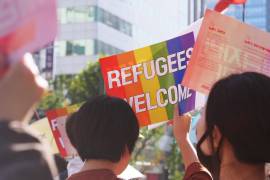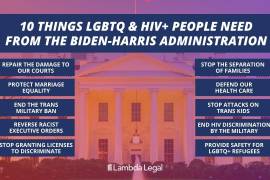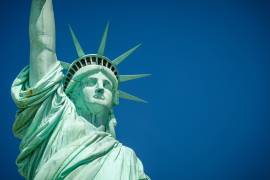
5 Reasons LGBT Immigrants Should Become U.S. Citizens This Citizenship Day
Blog Search
Today, September 17th, is Constitution and Citizenship Day. It is a federal observance that celebrates the adoption of the U.S. Constitution in 1787.
LGBT Americans have not always been afforded the equal protections provided under the Constitution or the benefits of being a U.S. citizen. At Lambda Legal, we work daily to ensure that our constitutions (federal and state) and the general rule of law do right by LGBT Americans and those living with HIV.
This year we have a lot to celebrate. The marriage equality victory at the U.S. Supreme Court is only the most recent testament to the wisdom of our country’s founding principles, many of which are captured beautifully in our Constitution. We know we have a long way to go until we reach that perfect Union, but that shouldn’t stop us from celebrating today what it means to be an American.
Recently, many civic groups have used Constitution Day to help eligible permanent residents to apply for citizenship. In addition to undocumented immigrants waiting for a path to citizenship (267,000 of whom are LGBT), there are more than 8 million documented immigrants (green card holders) living and working in the United States today who qualify for naturalization — becoming a U.S. citizen.
Here are five reasons to become a U.S. citizen, and some helpful links to Citizenship Help Clinics happening today and throughout this weekend:
1. Make a further commitment to this country.
This is the most important reason to become a U.S. citizen. Most immigrant families know this is not a decision taken lightly. Sure, there are benefits, but there are also responsibilities and obligations. Become a citizen to affirm that the U.S. is your home.
2. Reunite with family members faster.
Family reunification is one of the basic tenets of U.S. immigration law, because strong, united families contribute to a strong community and nation. If you are a U.S. citizen, your eligible family members get priority. For everyone else, there are category and country caps that have created an enormous backlog. Don’t wait any longer than necessary to have your spouse and family by your side.
3. Fight income inequality.
Naturalized immigrants earn more than permanent residents. This distinction is true even with LGBT immigrants. According to a report from the Williams Institute, “non-citizens in both same-sex and different-sex couples are economically disadvantaged. Comparing non-citizens to naturalized citizens in same-sex couples, the median annual personal income of non-citizen men in same-sex couples who are in the labor force is $24,000 versus $40,000 for their naturalized citizen counterparts. For women in same-sex couples, the comparable figures are $22,400 versus $45,000.”
4. Have a say in your future.
Voting has not always been tied to citizenship. Indeed, our democracy has experimented with various levels of inclusivity (and exclusivity) when it comes to suffrage. Today, however, if you want to vote in federal elections, you have to be a citizen. While electoral politics have not always been favorable to the rights of minorities (including LGBT people), LGBT Americans are increasingly becoming an influential voting bloc to be wooed, and have formed part of winning electoral coalitions. LGBT progress needs your vote.
5. Make the future.
While you can’t become President of the United States, you can run for public office and serve as a naturalized citizen, like Arnold Schwarzenegger did as governor of California. If you decide to run, there are organizations, like the Victory Fund, ready to help you win. Yes you can!
There are a lot of obstacles that can prevent green card holders from becoming citizens. This Constitution and Citizenship Day, let’s close the citizenship gap and help all U.S. permanent residents, especially LGBT ones, become citizens. Call the American Immigration Lawyers Association, one of the organizations leading this effort (1-888-839-8682), to locate the nearest help clinic. Or visit the National Association of Latino Elected Officials.




